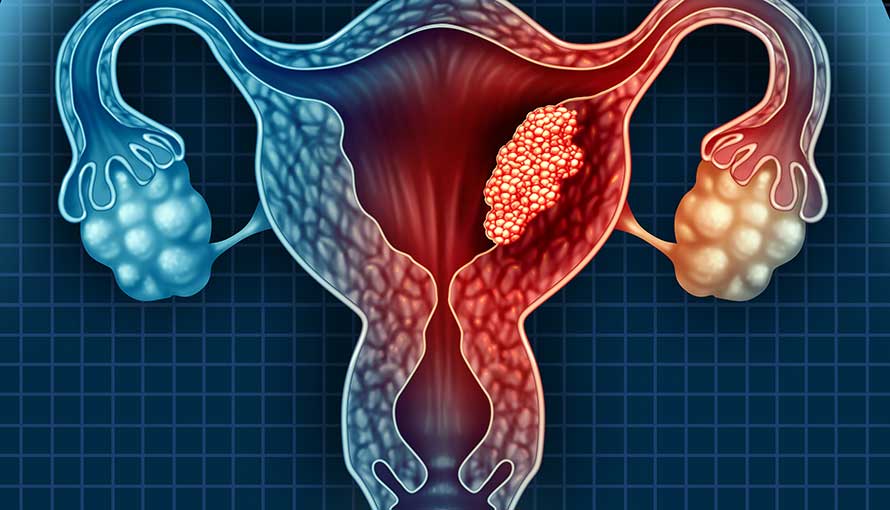Endometrial Cancer Treatment in Florida

Endometrial cancer, also known as uterine cancer, develops when, due to abnormal changes in the cellular structure, unneeded new cells form and old or damaged cells don’t die in the lining of the uterus. The most common symptom of endometrial cancer is abnormal vaginal bleeding. Other symptoms include:
- Unusual vaginal discharge or spotting
- Pelvic pain or pressure
- Pain during urination
- Pain during sexual intercourse
- Unexplained weight loss
- Anemia
Choosing an Endometrial Cancer Specialist in Florida
If you have been experiencing symptoms of or have been recently diagnosed with endometrial cancer you may want to consult with a specialist to discuss your options. Receiving a proper assessment or a second opinion on what treatment options to pursue is important.
Expertise and Experience
A gynecologic oncologist is a physician who is specifically trained to diagnose and treat cancers of the female reproductive system. You should feel comfortable asking your gynecologic oncologist any questions and comfortable in their experience treating gynecologic cancers.
Ask questions about how often they treat endometrial cancer, if you need to think about fertility preservation, and if you need surgery how often they perform that surgery.
Available Treatments
A patient’s treatment plan is dependent on the type, size, location and stage of endometrial cancer. Most commonly one of the following types of surgery is performed:
- Hysterectomy
- Bilateral salpingo-oophorectomy
- Radical hysterectomy
- Robotic gynecologic surgery
This may be followed up with adjuvant therapies like chemotherapy, radiation therapy, or hormone therapy.
Why do Patients turn to Moffitt?
Moffitt Cancer Center is the leading cancer hospital in Florida according to U.S. News & World Report. As such, our gynecologic clinic is an excellent choice for care, especially for people in Florida, and we’re able to offer some distinct advantages for patients.
Expertise
At Moffitt, our gynecological oncologists have their own respective areas of specialization, such as chemotherapy, radiation therapy or surgery. These professionals work in collaborative, multispecialty groups to coordinate each patient’s treatment. Using evidence-based best practices to guide their decisions, our gynecologic oncologists provide the comprehensive treatment and compassionate support that every patient deserves.
Clinical Trials
In addition to providing the latest treatment options for endometrial cancer, Moffitt offers a robust clinical trials program. As research advances like immunotherapy are made the Gynecology Oncology Program can match patients to trials that suit their particular diagnosis through the clinical trials program.
At Moffitt, we continue to make significant progress in researching and developing new cancer treatments. In recognition of our efforts, Moffitt is the only cancer center in Florida to be designated a Comprehensive Cancer Center by the National Cancer Institute.
Additional Services
With multiple locations across the Tampa Bay area, Moffitt offers convenient access to many throughout Florida. We also recognize the value of empowering our patients, their caregivers and families to be part of their healthcare experience and treatment decisions so we offer a range of support services to our patients and their families.
To learn more about treatment options for bile duct cancer or cholangiocarcinoma, call 1-888-663-3488 or complete a new patient registration form online. We provide access to a cancer expert as soon as possible.
Endometrial (Uterine) Cancer
- Adrenal Cancer
- Anal Cancer
- Appendiceal (Appendix) Cancer
- Astrocytoma
- Basal Cell Carcinoma
- Bladder Cancer
- Bone Metastasis
- Brain Cancer
- Brain Tumor
- Breast Cancer
- Cervical Cancer
- Cholangiocarcinoma (Bile Duct Cancer)
- Colon Cancer
- Colorectal Cancer
- Cutaneous Lymphoma (CTCL)
- Ductal Carcinoma In Situ
- Endometrial (Uterine) Cancer
- Esophageal Cancer
- Gallbladder Cancer
- Gastrointestinal Carcinoid Tumor
- GIST (Gastrointestinal Stromal Tumor)
- Glioblastoma
- Head and Neck Cancer
- HER2 Positive Breast Cancer
- Hodgkin Lymphoma
- Inflammatory Breast Cancer
- Invasive Ductal Carcinoma
- Kidney (Renal Cell) Cancer
- Leukemia
- Liver (Hepatocellular) Cancer
- Low-Grade Glioma
-
Lung Cancer
- Signs and Symptoms
- Diagnosis
- Treatment
- FAQs
- Lung Cancer Early Detection Center
- Lung Cancer Screening and Surveillance Program
- Lung Nodules
- Lung Surveillance Clinic
- Metastatic Lung Cancer
- Recurrence
- Survival Rate
- Your Lung Cancer Specialists
- Lung and Thoracic Tumor Education (LATTE)
- Thoracic Clinic Updates
- Insurance & Financial Information
- Lymphomas (Hodgkin and Non-Hodgkin)
- Melanoma
- Meningioma
- Merkel Cell Carcinoma
- Mesothelioma
- Metastatic Breast Cancer
- Multiple Myeloma-Plasma Cell Tumor
- Myelodysplastic Syndromes (MDS)
- Neuroendocrine Tumor
- Neurofibromatosis
- Non-Hodgkin Lymphoma
- Oral Cavity (Mouth) Cancer
- Oral Cavity or Throat Cancer
- Osteosarcoma
- Ovarian Cancer
- Pancoast Tumor
- Pancreatic Cancer
- Penile Cancer
- Pituitary Adenoma
- Prostate Cancer
- Rectal Cancer
- Sarcoma
- Skin Cancer (Nonmelanoma)
- Skull Base Tumors
- Small Intestine Cancer
- Spinal Tumor
- Squamous Cell Carcinoma
- Stomach (Gastric) Cancer
- Testicular Cancer
- Throat Cancer
- Thymoma
- Thyroid Cancer
- Tongue Cancer
- Tracheal Cancer
- Triple Negative Breast Cancer
- Vaginal Cancer
- Vulvar Cancer
